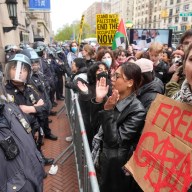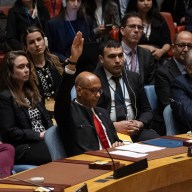 Marine Corps veteran Sean Jeffers suffers from post traumatic stress disorder. He said living in New York City can be overwhelming, but also beneficial, for returning vets. Credit: Bess Adler, Metro
Marine Corps veteran Sean Jeffers suffers from post traumatic stress disorder. He said living in New York City can be overwhelming, but also beneficial, for returning vets. Credit: Bess Adler, Metro
Sean Jeffers is a Marine Corps veteran and Brooklyn native. Discharged under honorable conditions in 1994, Jeffers is still managing his Post-Traumatic Stress Disorder diagnosis nearly two decades later.
Jeffers is currently in a vocational rehabilitative program with the Veterans Administration, working to complete his undergraduate degree. He expects to finish by the end of this semester.
Getting that degree is hugely important to Jeffers: it’s the reason he joined the Marine Corps in the first place. Jeffers had completed two semesters of college before he realized he couldn’t afford to continue.
“Ultimately, I wanted to go to college, I didn’t necessarily want to go into the military,” Jeffers said. “The military was a way for me to pay for college.”
Now Jeffers is eager to finish so he can pursue further education. He wants to be a therapist or a social worker, he said, and work with other veterans.
He’s been meeting with a career advisor in the meantime.
“We’re trying to see exactly what would be best for me, because they don’t want to put me in a position that would aggravate my PTSD,” he explained.
There are upsides and downsides to living in New York City.
Some vets say the crowds and noise can be overwhelming. Jeffers, a born and bred New Yorker who now lives in Harlem, says it’s easier than him than it is for others.
New York is his home, he said.
“For me, personally, I tend to avoid the crowds, I’m not necessarily traveling during rush hour and I’m not going to highly populated areas,” he said. But Jeffers tries not to give his PTSD so much power. He doesn’t want to feel like it controls him.
And there are benefits to being in the city too, he said. Some vets he knows in upstate New York don’t have as many different programs readily accessible. Some of them have to travel miles just to get to the nearest one.
Being so far away from help can exacerbate what already “can be a bit of a lonely journey,” Jeffers said.
“The whole PTSD thing, it sometimes causes you to push away from people,” he said. “So a lot of veterans live a lonely existence.”
That’s the biggest challenge for Jeffers: fighting the urge to isolate himself and “be away from everyone.”
But he noted the difference between his experience and that of the upstate vets is the diversity of resources available for him. He has his vocational program, as well as a Harlem-based vet center just blocks from where he lives.
“One you get out there, people are willing to help,” he explained. “There are programs out there, you have to be receptive to help.”
One of the programs he has found helpful is a clinic that offers free massages for veterans. It may seem like an unusual comfort for someone who is inclined to push people away, but he said it has been helpful, “really good and just relaxing.”
“When I go out, I want to be left alone,” he admitted. “But sometimes you go to places and people interact with you and sometimes it’s okay.”
The New York Open Center, operated by professionals from New York College, is one of those places, he said.
“It helps, it helps the process,” Jeffers said. “People are friendly, and I’m friendly back.”
If you go
The New York Open Center offers free massages to veterans.
134 west 26th street suite 9
(212) 924-3706
Correction: Sean Jeffers is not a veteran of the Gulf War, as the cover of the Monday, Nov. 11 edition of the newspaper stated. Metro regrets the error.
Follow Danielle Tcholakian on Twitter @danielleiat
















